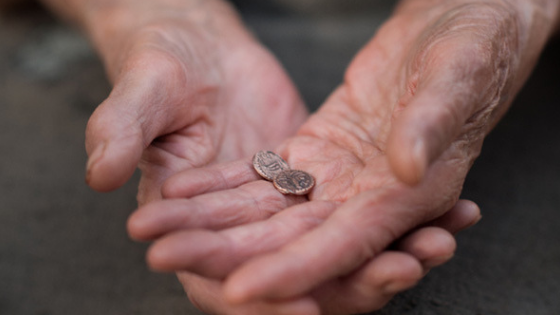
Palm Sunday 25th March 2018
Readings: Is 50:4-7. Ps 22:8-9, 17-20, 23-24. Phil 2:6-11. Mk 14:1-15:47
Theme: What she has done will be told as well in memory of her. (Mk 14:9)
Mark begins the first eleven verses of the Passion narrative by using a framing technique. Framed between the plotting of the chief priests and the scribes to arrest Jesus (v1-2) and the betrayal of Judas (v10-11) is the extraordinary story of an unknown woman who anoints Jesus. The framing adds pathos and poignancy, highlighting the abundant generosity of the woman, sand-witched between the trickery of the chief priests and scribes and the betrayal of Judas. In exploring the story of the un-named woman we are in fact entering into the essence of the Passion and for that Jesus wants her remembered.
The story is set in Bethany in the dining of the house of Simon, who suffered from leprosy. The entry of a woman carrying an “alabaster jar of ointment, pure nard” (v3), is followed by two dramatic actions on the part on her part. “She broke the jar (an irretrievable act) and poured the ointment on his head”. (v3-4) It is worth noting that the jar is made of alabaster, which is translucent, hinting at the light that is being thrown on the whole Passion narrative through the translucent container and the actions that follow. The woman never utters a word but her actions convey a deep sense of being intuitively in touch with what is about to happen.
Her actions bring an indignant response from some of those present. “Why this waste of ointment?” (v4-5) Jesus acknowledges their concern, mindful of Deut. 15:10-11, “Of course, there will never cease to be poor people in the country, and that is why I am giving you this command: Always be open to your brother, and with anyone in your country who is in need.” His audience, apart from the woman, misses the point that the poor brother is there in front of them, since “no one is so poor as the one about to die”. (Flowers in the Desert p151).
Jesus defends her actions and acknowledges that what “she has done for me is a good work”. (v6). The New Jerusalem Bible comments on “a good work” by pointing out that it “may possibly be in a Jewish technical sense, the works of compassion being ranked as superior to the duty of almsgiving…”. Michael Crosby in his book Repair my House – becoming a Kindom Catholic states that the woman’s “good deed” can be seen as “a religious activity and linked to the divine action and cosmic action of God’s ‘good deed’ at the beginning of the world…” (p93)
Why does Jesus state that this story is an essential part of the gospel? By the woman’s actions of breaking the alabaster jar and the prodigious pouring of the ointment, she has enacted what Jesus is about to do through his passion. His body will be broken and what is most precious, his blood will be poured out in self-giving love, in his role as the Anointed One of God. Her compassionate resourceful presence has prepared him for his burial.
Reflection: What if we were more aware of the cosmic significance of our “good deeds”?
Bibliography: Crosby, Michael, Repair my House – Becoming a Kindom Catholic (Orbis Books –Box 302, Maryknoll, NY 10545-0302, 2012). Dumm D. Flowers in the Desert (Paulist Press NY/Mahwah 1987. The New Jerusalem Bible (Standard version), (London, Darton, Longman &Todd, 1985)
This week’s teaching commentary was prepared by
Moya Hegarty os, Sligo, N. Ireland
Bat Kol Alumna, 2007/2015
moyaosu@eircom.net
[Copyright 2018]
…………………………………………………………..
PLEASE NOTE: The weekly Gospel commentaries represent the research and creative thought of their authors, and are meant to stimulate deeper thinking about the meaning of the Sunday Scriptures. While they draw upon the study methods and sources employed by the Bat Kol Institute, the views and conclusions expressed in these commentaries are solely those of their authors, and do not necessarily represent the views of Bat Kol. Questions, comments and feedback are always welcome.
…………………………………………………………
Bat Kol Institute for Jewish Studies, Jerusalem
1983-2018
“Christians Studying the Bible within its Jewish milieu, using Jewish Sources.”
Website: www.batkol.info gill@batkol.info



